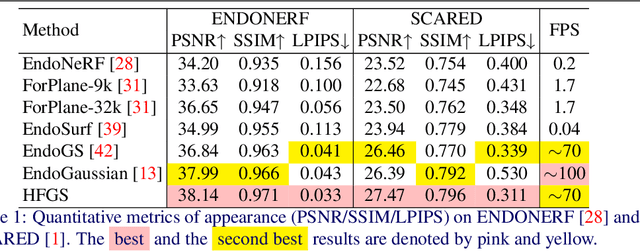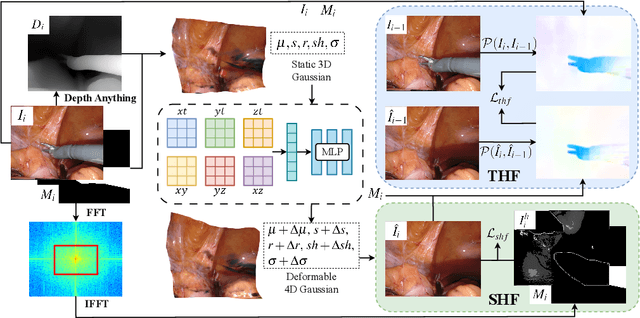HFGS: 4D Gaussian Splatting with Emphasis on Spatial and Temporal High-Frequency Components for Endoscopic Scene Reconstruction
Paper and Code
May 29, 2024



Robot-assisted minimally invasive surgery benefits from enhancing dynamic scene reconstruction, as it improves surgical outcomes. While Neural Radiance Fields (NeRF) have been effective in scene reconstruction, their slow inference speeds and lengthy training durations limit their applicability. To overcome these limitations, 3D Gaussian Splatting (3D-GS) based methods have emerged as a recent trend, offering rapid inference capabilities and superior 3D quality. However, these methods still struggle with under-reconstruction in both static and dynamic scenes. In this paper, we propose HFGS, a novel approach for deformable endoscopic reconstruction that addresses these challenges from spatial and temporal frequency perspectives. Our approach incorporates deformation fields to better handle dynamic scenes and introduces Spatial High-Frequency Emphasis Reconstruction (SHF) to minimize discrepancies in spatial frequency spectra between the rendered image and its ground truth. Additionally, we introduce Temporal High-Frequency Emphasis Reconstruction (THF) to enhance dynamic awareness in neural rendering by leveraging flow priors, focusing optimization on motion-intensive parts. Extensive experiments on two widely used benchmarks demonstrate that HFGS achieves superior rendering quality. Our code will be available.
 Add to Chrome
Add to Chrome Add to Firefox
Add to Firefox Add to Edge
Add to Edge